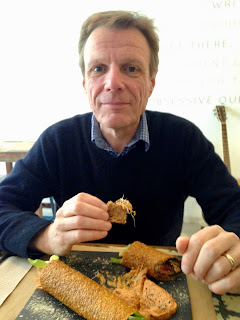 |
| Rachel, Annabelle and Steve |
Vegetarians and vegans are people who have plant based diets; they don't eat animal meat. Vegans go further by completely avoiding any animal products which includes wool, honey, eggs, milk etc. So, is being a vegan a healthy thing to do? Are vegan children victims of child abuse? Do vegans have good or bad diets? Do vegans live longer than meat eaters? These are all good questions which people ask and I've pondered some of these myself. Well, since drifting from an intermittent meat eater to a complete vegetarian a few years ago, this has been on my mind for some time.
We only have three friends who are vegan: Steve, Rachel and their daughter Annabelle. I recently invited myself 'round to their house after work one evening for a scrummy meal and a natter. We spent some time exploring the issue; I have only known them as vegans and I was keen to hear about their journey and what has taken them along that path.
Here goes. We've known Steve, Rachel and Annabelle since the 1990s and we have always been impressed by their thoughtful, consistent and firm approach on a range of issues. We admire them for their strong principles. I think the world needs a few more people like them! This was a good opportunity to get down to the wholefood reality.....
I asked about the drivers, the reasoning behind veganism. For Steve and Rachel, they recounted the stories of young animals being exported to the Continent in appalling conditions: I instantly remembered those old news stories. Young calves were being shipped in crates, shortly to become veal. Horses were being transported for slaughtering, cattle were (and are) being bred for ever-increasing milk production. They just didn't want to be part of that anymore. For me, I sort of knew of this kind of thing had happened (almost everyone watches the news on TV or reads a newspaper) but it hadn't really moved me in the same way. Perhaps I was starting to recognise my own selfishness; being a vegetarian was about becoming healthier and as a spin-off equalising the food distribution around the world was merely some kind of bonus. That alone, I realise, is not enough. Being a vegan because of animal welfare issues was clearly a matter of conscience for them, and for this they- and the whole vegan movement - should be admired and taken more seriously.
Tell me about the health benefits of being vegan
Firstly, you only have to look at Steve and Rachel to see they're pretty healthy. No sign of being over weight or anything like that; Annabelle is a delightfully healthy and lively teenage girl.
We get down to the details and Steve starts to get more serious with me. He explains the reality is, for vegans, they're less likely to have "lifestyle" health problems. Vegans tend to live longer. They are less likely to be constipated and never really need to worry about their weight. Cancers are less common in vegans along with type 2 diabetes, heart disease and all of the modern-day killers. Rachel adds that it doesn't happen by chance - you need to take care in what you eat and even vegans can get fat! Being vegan on it's own doesn't suddenly make you thinner, leaner or healthier. It needs a plan.
In terms of eating a good balanced diet, in practice vegans know they can't just get by through chance. The "shovel it all in and hope for the best" approach just isn't going to work and the thing about deficiencies in diets is that you might not realise there's a problem for quite some time. Like most vegans, they take an interest in what they eat. Steve explained how he had to point this out to a colleague who was a bit sceptical of him being a vegan. He shared a list of the meals they eat, over a two week period and it's then you can see the variety, the wide range of foods and each with their purpose. Steve's colleague was impressed, thoroughly out-witted and duly put in his place. When you stop to think of all the fruits we can buy (and grow!), the vegetables, the nuts, the spices, the grains.... the list goes on and it really is an incredible range - surely you'll know it is far from a bland diet!
Steve and Rachel are in pretty good shape. Even at 62 Steve talks about briskly shooting up several flights of stairs at work, taking it in his stride and yet others who are 20+ years younger huff and puff their way up. Even body-building gym goers need to take note! Rachel has practised yoga since her childhood and taught yoga for many years (
click here for her website) and I'm now learning is more than being a fitness regime on it's own. It's something I know little or nothing about beyond being supple and stretchy (hey - isn't that what good runners need to be?) and it is said to integrate mind, body and spirit.
Are vegans modern-day hippies, tree huggers who always make you feel guilty?
Well, are they? In a word - no. But they could be. So could you, me....
There is no doubt, there was a natural link between being vegan and the question of animal welfare, the environment, trading practices and a whole load of other issues. Have you ever wondered why we have hungry people in the world? Have you ever wondered why we have such modern farming methods with very "efficient" milk and meet production and yet we have such poor economic use of the land? If you imagine the amount of land you need to raise one cow which might be enough to provide food for one person, that same amount of land would be enough to feed 30 people from other vegetarian produce. If this kind of issue was considered more seriously at government level across the world, the food shortages and the mistakes made in food distribution, could be corrected almost overnight.
As the conversation went along with Steve and Rachel, I knew that I was going to be stereotyping vegans, sooner or later. I asked if it was such a thing as an average of vegan. Together we smiled at each other, I just knew I was getting onto tricky ground. Rachel went on to explain that it's possible there are some gender differences between vegans. It's possible that more women are vegans compared with men. Some men might feel more threatened by vegans, perhaps. Some men might not feel as if they're being "real men" if they don't eat meat, or they might feel they are being less masculine. Together we wondered whether men would be more wary of vegetarianism or being vegan. Do women have more empathy for this kind of issue? An interesting question.
Raising vegan kids is child abuse?
This issue might be a thorny hand grenade lobbed at vegan parents from time to time. Steve dealt with this succinctly with "making your kids eat a MacDonalds meal is more abusive than being vegan could ever be".
Asking Annabelle why she thought being vegan was important to her, she explains how cruel it is to eat animals and adds "if it has a face I couldn't eat it". Annabelle echoes her parent's views with the ethical and environmental aspects and doesn't grumble about the vegan diet at all. In fact I asked if she misses ice cream and chocolate but I'm easily put in my place as there are vegan alternatives! Most of the people she interacts with know she's vegan and bear that in mind, but just occasionally she might feel slightly left out but finds most people remember and will cater for her and usually bring something for her, so not too much of a problem really.
How do people react to you being vegans?
"Oh, it's easy for some people to bash vegans" Rachel explained. For myself, yes, I can imagine that happening, sadly.
"Other people", Rachel explained "will react differently. It's true some people may sometimes be hostile, some even think we're mad but moreover many people are curious and interested, just like you Doug".
We got onto talking further about people's reactions and perceptions. Just as I have found, through being a vegetarian, restaurant menus can sometimes be a little limited it can be more of a challenge for vegans. In fact, Steve and Rachel will sometimes call a cafe or a restaurant that they might be thinking of using, just to check vegans are catered for. The reactions seem quite amazing, right through from the "yes, don't worry, we'll get something organised" and the restaurant goes the extra mile to ensure there's a good vegan meal waiting to be served. The opposite extreme goes along the lines of "yes we do cater for vegans, we have some lovely Sea Bass on the menu"
"Well what about pasta? Do you do any vegan based pasta meals?"
"Yes Sir, we do. We have meat balls with pasta"
Sounds incredible, doesn't it? Yes it does, but somehow I'm not too surprised and I am saddened by that reality. Although we might laugh and joke about this lack of understanding, it does point to a level of misunderstandings throughout society and how being vegan is very much of a minority choice these days. Through the conversation Steve picks up on this "just because [meat eaters] are the majority, it doesn't make it right. Our morals, our integrity, our ethics all point to why we're vegans."
I feel challenged
Yes I feel challenged but Steve and Rachel were understanding about this. There's a general feeling of us all being on a journey together, a journey through life. Sometimes we can make profound decisions in life and will always know the exact date a decision was made. Some of my Christian friends will point to an exact date when they made that commitment, for myself it was a more gradual commitment through gradually working it out in my own time. Other times change can be even more gradual for different people and we can drift through changes - this can be right for some people, for others being more decisive is right for them.
I can recognise more easily the wide variety of reasons why people become vegetarian, vegan, tee total, drug free or whatever the choice is. For each of us our values will be a little different: that's fine, we're all different and I'm thankful for that. Sometimes we can be shocked into making those choices, like Steve and Rachel becoming aware of how badly animals were treated all those years ago. Other times it is a gradual shift in our outlook taking place which in turn leads onto more gradual changes.
There's no doubt in my mind that being a vegetarian has been a positive step in my life. I feel healthy, I feel as fit as I've ever been and I'm confident I've got a pretty good diet. Now my own challenge is about reconciling all those strong arguments that point towards being a vegan.
Are you a vegan, perhaps a vegetarian? Why? Why not?
Please leave a comment below, I'd love to hear some views on this, doesn't matter what country you're from, whether you're a runner or not. I'd just like to hear your views...




















